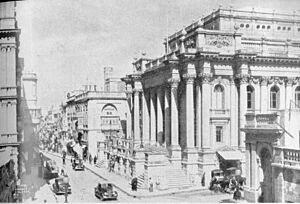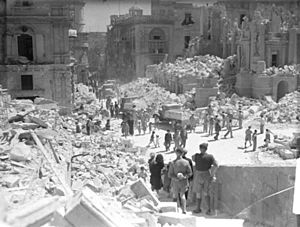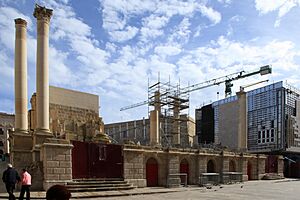Royal Opera House, Valletta facts for kids
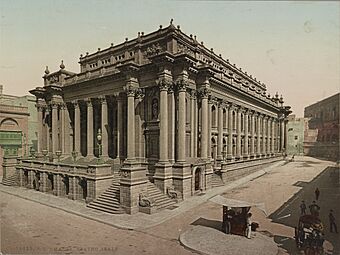
Royal Opera House in 1911
|
|
| Address | Republic Street Valletta Malta |
|---|---|
| Type | Opera House |
| Capacity | 1295 |
| Construction | |
| Opened | 1866 |
| Rebuilt | Reopened as open-air theatre in 2013 |
| Years active | 1866–1873 1877–1942 |
| Architect | Edward Middleton Barry |
The Royal Opera House, also known as the Royal Theatre, was a famous place for shows in Valletta, Malta. People called it Maltese: It-Teatru Rjal in Maltese and Italian: Teatro Reale in Italian. An English architect named Edward Middleton Barry designed it. The building was finished in 1866.
Sadly, in 1873, a big fire badly damaged the inside of the theatre. But it was fixed and reopened in 1877. Then, during World War II in 1942, the theatre was hit by bombs from the sky. Before it was destroyed, it was one of Valletta's most beautiful buildings. For many years, there were plans to rebuild it, but they never happened. Finally, in 2013, an Italian architect named Renzo Piano redesigned the ruins. Now, it is an open-air performance space called Pjazza Teatru Rjal.
Contents
History of the Royal Opera House
The job of designing the theatre went to Edward Middleton Barry. He was also the architect for the famous Covent Garden Theatre in London. His first design for the Royal Opera House was ready by 1861.
However, the original plans needed changes. The streets next to the theatre were on a slope, and this was not considered at first. So, a special terrace was added on the side facing Republic Street. Maltese architects designed this part.
Building the Theatre
Construction started in 1862. An old building called the Casa della Giornata was taken down to make space. The new Opera House was 206 feet (63 m) long and 112 feet (34 m) wide.
After four years of work, the theatre was ready. It could seat 1,095 people and had space for 200 people to stand. The grand opening happened on October 9, 1866.
Fire and Rebuilding
The theatre did not last long in its first form. On May 25, 1873, just six years after it opened, a fire destroyed the inside. The outside walls were still standing, but the intense heat damaged the stone inside.
People decided to rebuild the theatre. There was a lot of discussion about whether to change the front of the building. After almost four and a half years, the theatre was ready again. On October 11, 1877, it reopened with a show of Verdi's opera, Aida.
World War II Destruction
About 65 years later, the Royal Opera House faced another disaster. On April 7, 1942, during World War II, German planes bombed the theatre.
The next morning, people saw what was left of their national theatre. The front entrance and the main seating area were just piles of stones. The roof had a huge hole with twisted metal beams. However, the back part of the building was still standing.
The remaining parts of the theatre were taken down in the late 1950s. This was done to make the area safe.
Plans for Reconstruction
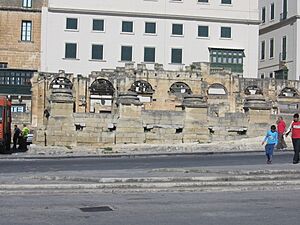
After the bombing, much of the rubble was cleared away. All the fancy decorations were removed. But rebuilding the theatre was put off many times by different governments. They felt other projects were more urgent.
In 1953, six famous architects presented designs for a new theatre. One design was chosen, but the project stopped when a new government came into power. They said they could not spend so much money on a theatre when other things needed attention. Even though money was set aside for the theatre in 1955, it was never used. By 1961, plans for the theatre were no longer mentioned in the country's development plans.
In the 1980s, the architect Renzo Piano was asked to design a new building for the site. He was also asked to improve the city's main entrance. Piano submitted his plans in 1990, and the government approved them. But again, the work never started.
In the late 1990s, a Maltese architect named Richard England also created plans for a cultural center. However, arguments and disagreements always stopped these projects.
Pjazza Teatru Rjal: A New Beginning
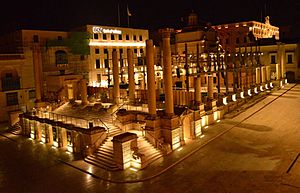
Pjazza Teatru Rjal, illuminated at night
|
|
| Address | Republic Street Valletta Malta |
|---|---|
| Type | Theatre |
| Construction | |
| Opened | 2013 |
| Years active | 2013–present |
| Architect | Renzo Piano |
| Website | |
| pjazzateatrurjal.mt | |
In 2006, the government suggested building a new Parliament House on the site. At that time, Parliament was in the old Armoury of the Grandmaster's Palace in Valletta. Many people did not like this idea. They had always hoped the site would become a cultural place.
However, Renzo Piano was asked again to create new designs. The idea for Parliament on the site was put on hold. Then, in 2008, Prime Minister Lawrence Gonzi brought the idea back. He announced a budget of €80 million.
Piano convinced the government not to build Parliament on the Opera House site. Instead, he planned a new Parliament House in Freedom Square. He also redesigned the city gate. For the Opera House site, Piano suggested an open-air theatre.
The building of this open-air theatre by Piano was very debated. But the government went ahead with the plans. The open-air theatre officially opened on August 8, 2013. It was named Pjazza Teatru Rjal, which means Royal Theatre Square. Even when written in English, people usually use its Maltese name.
 | Chris Smalls |
 | Fred Hampton |
 | Ralph Abernathy |


